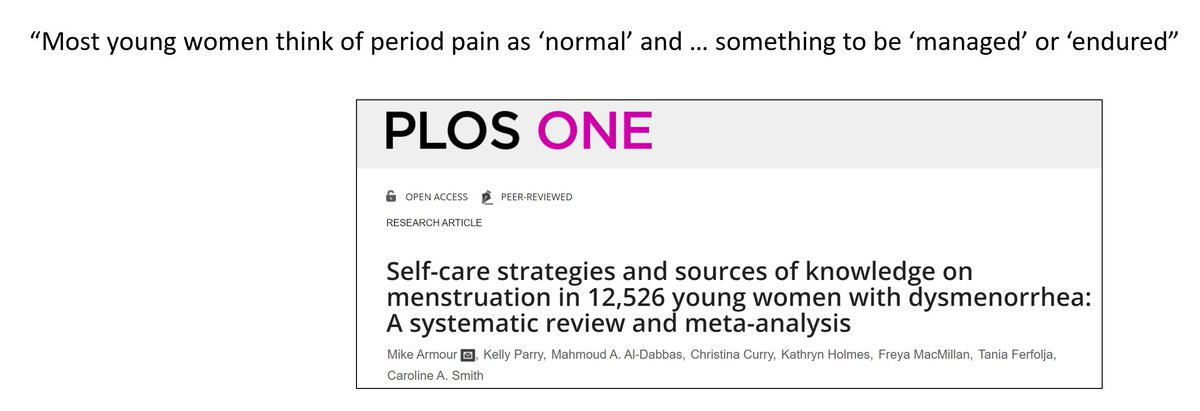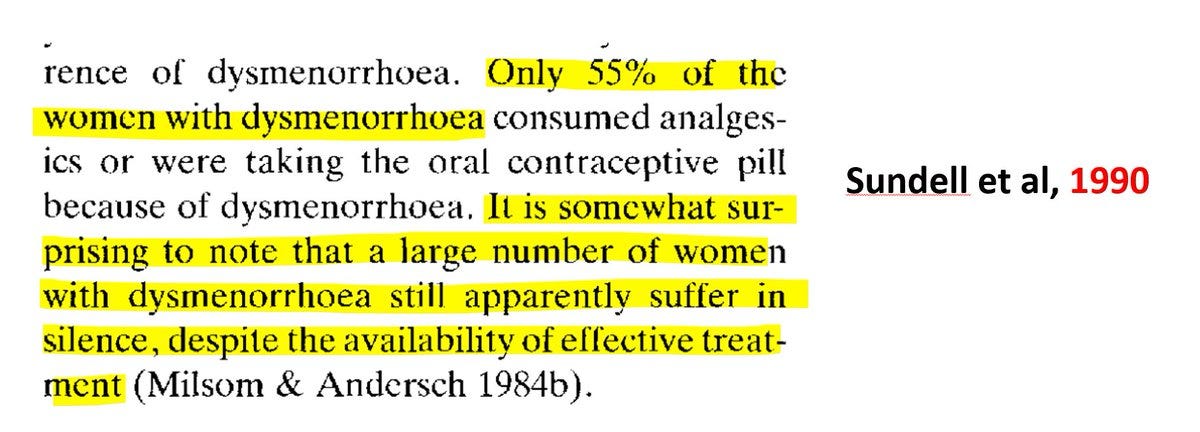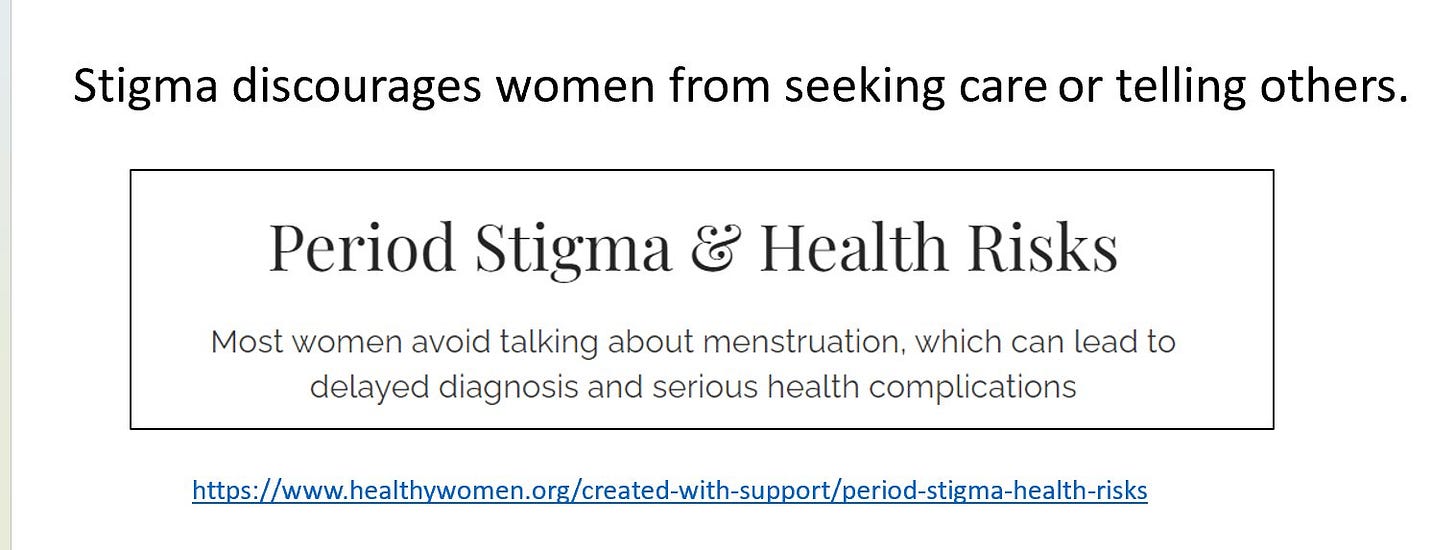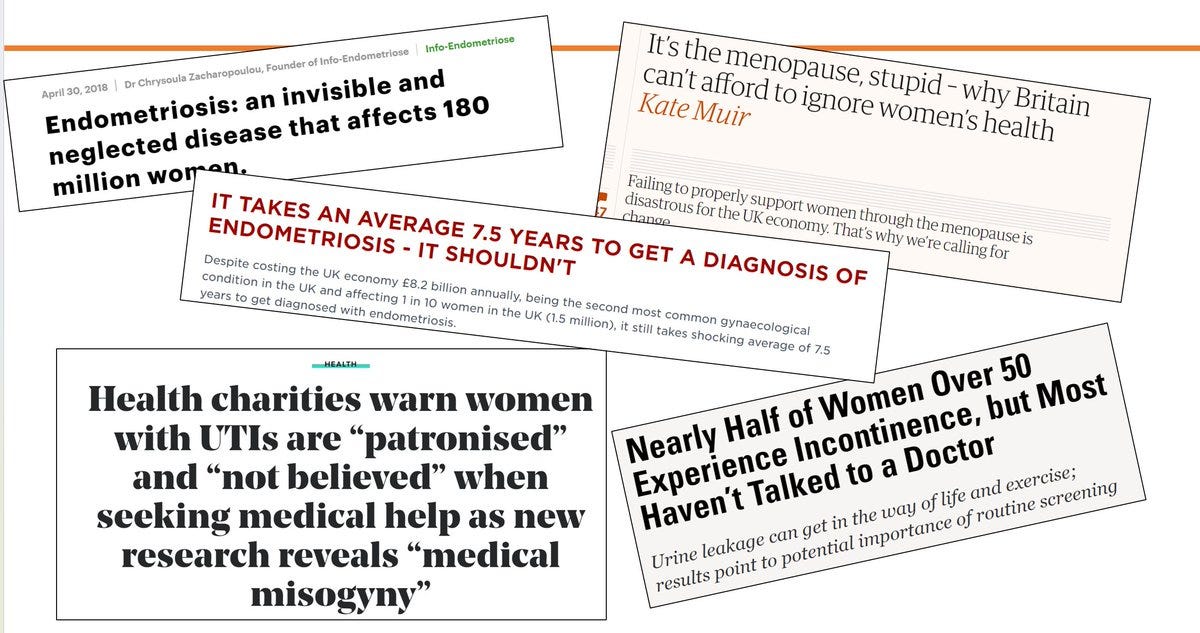The BBC ran an article today with this headline:
and it made my blood boil. The solution is NOT to force girls in pain to attend school. The solution is to do something about their pain so they don't lose days every month.
I’ve been working (slowly) with colleagues at the London School of Hygeine and Tropical Medicine and the Health Foundation on a project looking at common - but debilitating - problems with periods for a couple of years. In light of the stupid, idiotic, ignorant policy to force girls into school with pain, I’ve converted a Twitter Thread I wrote in 2022 as part of project into this substack post to share some actual facts which I hope will make you all hopping mad too.
We need to be much more open about talking about periods and the things that can (and often do) go wrong - and that includes the men in our lives to stop being embarrassed!
****************************************
The continuing stigma and silence around periods is pathetic, wrong, devastating for women and economically nonsensical.
Women of reproductive age are a third of our population (18 million in England!) - most of these women have periods. Plus there non binary people and trans men who also experience periods - and the things that can go wrong.
And periods going wrong is really common!
Heavy menstrual bleeding
1 in 4 women experience heavy menstrual bleeding.
You often bleed through sanitary products super fast. You bleed onto your clothes, onto furniture. It's *excruciatingly* embarrassing.
Many women with heavy bleeding don't leave house during their periods.
Severely painful periods
1 in 5 (20%) women experience severely painful periods. You can't study or work - often you just want to curl into a ball and stay there forever. Sometimes the pain is so bad, women faint or vomit.
Plus between 50%-75% women experience some pain.
Timing of period problems
Periods change over time. Heavy bleeding & pain peak when your periods start - so when you're a teenager & into early twenties. An important time in a person's life.
Heavy bleeding then rears its ugly head again at menopause with a second peak for women in their 40s.
For some women, pain & heavy bleeding remain terrible throughout adulthood. Often (but not always) the cause is endometriosis, affecting 1 in 10 women. It takes an average of *8* years to be diagnosed - often women are only taken seriously when it affects their fertility.
Ignorance and stigma
There are significant barriers preventing women from seeking help.
The first is that many women simply don't know what is a normal amount of bleeding or pain - so they don't know when their periods are going wrong.
Most think of period pain as something to be endured.
Even if they recognise that they are suffering from extreme bleeding or pain, many women don't know that treatments exist!
One study estimated that 1.6m women in Japan suffer severe pain - and that most them are NOT getting guideline treatment.
A paper from *1990* reported that only 55% of women with severe pain took painkillers or the pill for their pain. They thought it *surprising* how many women still suffer in silence without good treatment.
This was written OVER THIRTY YEARS AGO. How little has changed.
We still aren't talking about it enough! Stigma prevents women from seeking care. 48% of young UK girls are embarrassed by their periods. We don't talk about it to each other.
Even if we do seek care, women are often not taking seriously.
And it's not just period pain - women with the same chest pain symptoms as men take longer to be seen, less likely to receive painkillers & more likely to be diagnoses with anxiety!
Consequences of ignoring menstrual problems
It really matters. Up to a third of girls/young women regularly miss days of school or university.
Those who go but are in pain do less well. Imagine the impact of missing a few days of school every month? of doing an important exam in excruciating pain?
A US study estimated $600 million working lost every year to period pain. Other Studies in US & Japan put annual cost at $billions.
Lost productivity of women in work but in pain is even higher than that from missing work.
Women with heavy bleeding are more likely to miss work. A paper from *1978* said that period pain is the greatest single cause of lost working hours and school days among young women.
Think of all the things that have changed in the last 50 years! Women suffering with periods going wrong has stayed the same. It's insane.
Treatments
There are effective treatments for heavy bleeding - but far too few women access them.
For periods - it's painkillers (mainly ibuprofen) or hormonal contraception.
Paracetemol only works for about half of women. Ibuprofen better but doesn't work for 25%-40% of women... Plus about 20% of women can't take ibuprofen for medical reasons.
Hormonal contraception is pretty good but doesn't work for about 15% of women. Plus many girls/women don't want to take it for other reasons. Many teens never access it because they don't know - or feel able - to ask.
There are other treatments but they are poorly researched or evidenced. Treatments have not really moved on for 40+ years!
One doctor commented that given how bad the pain is where is the research?
Academic research into menstural problems is lacking
One study showed the diseases that primarily affect men are overfunded and those affecting women underfunded.
This bias over decades (centuries?) has led to conditions affecting mostly women being neglected. Periods are a prime example!
I did a quick academic literature search.
Over the past 5 years, I found over 3,700 papers on sexual dysfunction in men vs fewer than 1,000 papers on menstrual disorders in women. Not OK.
We are at least starting to recognise this. Whether it's periods, menopause, urinary tract infections (the bane of so many women's lives!), urinary incontinence.. you name it, we've stigamatised it.
We're underresearching it, underdiagnosing it and undertreating it.
Unequal periods
And this is all before we talk about period poverty - affecting women here and particularly in low and middle income countries. In 2018, 27% of girls in the UK have overused a sanitary product because they couldn’t afford a fresh one. This has gone up to 41% in 2023.
In many countries, menstruation is key factor in driving girls out of secondary education. These figures are in the Plan International sobering report about Period Poverty.
Being embarrassed about periods, taboos for women talking about them, men not wanting to know, has all stopped us researching & treating it.
It's wasting women's productivity and potential. Too little has changed in fifty years. This has to stop. We must stop thinking women's health can wait.
PS there is now a lot more going on to try to break the taboos, from Plan UK, to Action Aid, to the Menstrual Health Coalition, to the wear white again campaign. Do have a look.
wearwhiteagain.co.uk
plan-uk.org/act-for-girls/…
menstrualhealthcoalition.com



















I was once disciplined at work for taking about one day a month off sick due to period pains in my thirties. We just put up with that sort of ignorance, and it's high time the issue is taken seriously. Thank you for this campaign.
A friend came from an Indian sub continent culture where she was commanded to sleep on the floor beside her bed so as not to contaminate it when she had her period. It was only when she got to Uni she realised it was her bed and she could sleep there if she wanted to.